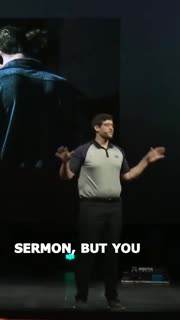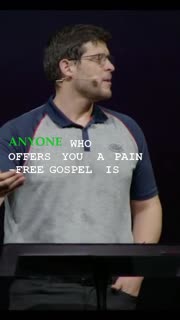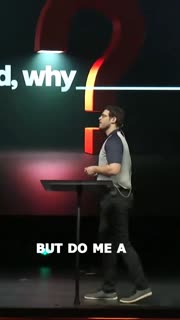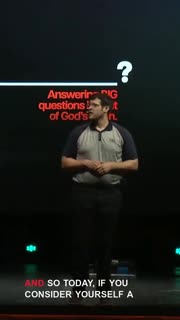Finding Hope and Healing in Suffering
Devotional
Sermon Summary
Bible Study Guide
Sermon Clips
1. "There are times you don't need a sermon, but you need a small group leader who will walk with you through life. You need a friend who will be faithful to say, hey, during this season, I'm with you, and yet at the same time, I don't want to overlook the power of theology, because I believe, to my core, that this idea is true, that theology has consequences, and bad theology has victims. What I mean by that is what you believe influences what you do, and what you do over time becomes who you are." [34:11] (30 seconds)
2. "The gospel is not this Sunday thing that we isolate, and keep alone, and pull out like a business card when we're at church, and then put away when we go out to the world. No, and it's integrated into our life. Now, if you read the New Testament, if you read the biographies about Jesus, Matthew, Mark, Luke, and John, there's no doubt you'll find at times Jesus healing people. He hits that easy button, and suddenly the lame person is walking, the blind person is seeing, the dead person is raised back to life." [35:44] (28 seconds)
3. "See, there is no greater miracle than meeting Jesus. There's no greater miracle than having a love relationship with the creator of the universe. And I started to think about it this week. I said, wait a second, if the temporary healing is meant to make life better in the short term, and if the message is greater than just the miraculous sign, it must mean that the message has the power to make life better, fuller, wholer, forever. There's something in the message that we absolutely need to hear, knowing Jesus becomes paramount in this journey." [43:17] (40 seconds)
4. "Don't settle today for Jesus, God, fixing your temporary problem, miss out on the eternal problem that we are separated from God. That in his love for you, man, he wants to be with you, man. Think about that. The God of the universe knows all of your baggage, right? Like, he sees you before you put on makeup in the morning. He sees you with your love handles. I almost fell off the stage. Got close. He sees us when we're teetering on the edge, and he says, I still want relationship with you. I still love you." [44:39] (38 seconds)
5. "The gospel is that in the midst of pain, our God shows up, does something about it, and offers us the path to wholeness. See, Paul does something wild. He has pain. He is a laundry list. If you think your pain resume is long, Paul's probably is longer. And he comes to God, and he says, listen, God, fix it. Hit the easy button. And God says, no. You guys remember what he said? What did he say? I don't think that's right. He said, my grace is sufficient for you. My grace is sufficient for you. In other words, I'm enough. If you have nothing, but me, you have everything. I'm enough." [50:52] (53 seconds)
6. "Anyone who offers you a pain-free gospel is lying. Anyone who offers you peace and prosperity forever, always upwards to the right, is a liar. Jesus shows us that he goes through the pain. See, the prosperity gospel wouldn't have made sense to Abraham, Isaac, Jacob, Isaiah, Jeremiah, Jesus, Paul, Peter, James, John, Andrew, Thomas, Simeon, and all the rest. It never would have made sense. The pain-free gospel wouldn't have made sense for the first 350 years of the Christian faith." [01:01:02] (34 seconds)
7. "But do me a favor in the midst of our discussion of the theology around pain and suffering and God's ability to hear, don't allow the pain to drive you away from God. Allow it to run to the God. Don't let it run to you. Don't let it run to the God who has been authenticated. Allow it to draw you close to the body, the church, the ark. Allow it to drive you to be part of Jesus' bride. And I can't offer you pain-free today. I never would. But instead, I can offer you purpose in the midst of pain. I can offer you truth in the midst of confusion." [01:07:51] (39 seconds)
8. "And so today, if you consider yourself a believer, understand what gift God has given you. Don't underestimate it. If you're out there and you're saying, should I actually follow this Jesus that you're talking about? My challenge to you is this. Invite God to be with you. Be your Lord and Savior. Invite Him to be your King and watch what happens when He brings you into a different kingdom. Know that as a church, one of the things we long to be is a spiritual hospital for the hurting." [01:07:51] (33 seconds)
Ask a question about this sermon
2. "The gospel is not this Sunday thing that we isolate, and keep alone, and pull out like a business card when we're at church, and then put away when we go out to the world. No, and it's integrated into our life. Now, if you read the New Testament, if you read the biographies about Jesus, Matthew, Mark, Luke, and John, there's no doubt you'll find at times Jesus healing people. He hits that easy button, and suddenly the lame person is walking, the blind person is seeing, the dead person is raised back to life." [35:44] (28 seconds)
3. "See, there is no greater miracle than meeting Jesus. There's no greater miracle than having a love relationship with the creator of the universe. And I started to think about it this week. I said, wait a second, if the temporary healing is meant to make life better in the short term, and if the message is greater than just the miraculous sign, it must mean that the message has the power to make life better, fuller, wholer, forever. There's something in the message that we absolutely need to hear, knowing Jesus becomes paramount in this journey." [43:17] (40 seconds)
4. "Don't settle today for Jesus, God, fixing your temporary problem, miss out on the eternal problem that we are separated from God. That in his love for you, man, he wants to be with you, man. Think about that. The God of the universe knows all of your baggage, right? Like, he sees you before you put on makeup in the morning. He sees you with your love handles. I almost fell off the stage. Got close. He sees us when we're teetering on the edge, and he says, I still want relationship with you. I still love you." [44:39] (38 seconds)
5. "The gospel is that in the midst of pain, our God shows up, does something about it, and offers us the path to wholeness. See, Paul does something wild. He has pain. He is a laundry list. If you think your pain resume is long, Paul's probably is longer. And he comes to God, and he says, listen, God, fix it. Hit the easy button. And God says, no. You guys remember what he said? What did he say? I don't think that's right. He said, my grace is sufficient for you. My grace is sufficient for you. In other words, I'm enough. If you have nothing, but me, you have everything. I'm enough." [50:52] (53 seconds)
6. "Anyone who offers you a pain-free gospel is lying. Anyone who offers you peace and prosperity forever, always upwards to the right, is a liar. Jesus shows us that he goes through the pain. See, the prosperity gospel wouldn't have made sense to Abraham, Isaac, Jacob, Isaiah, Jeremiah, Jesus, Paul, Peter, James, John, Andrew, Thomas, Simeon, and all the rest. It never would have made sense. The pain-free gospel wouldn't have made sense for the first 350 years of the Christian faith." [01:01:02] (34 seconds)
7. "But do me a favor in the midst of our discussion of the theology around pain and suffering and God's ability to hear, don't allow the pain to drive you away from God. Allow it to run to the God. Don't let it run to you. Don't let it run to the God who has been authenticated. Allow it to draw you close to the body, the church, the ark. Allow it to drive you to be part of Jesus' bride. And I can't offer you pain-free today. I never would. But instead, I can offer you purpose in the midst of pain. I can offer you truth in the midst of confusion." [01:07:51] (39 seconds)
8. "And so today, if you consider yourself a believer, understand what gift God has given you. Don't underestimate it. If you're out there and you're saying, should I actually follow this Jesus that you're talking about? My challenge to you is this. Invite God to be with you. Be your Lord and Savior. Invite Him to be your King and watch what happens when He brings you into a different kingdom. Know that as a church, one of the things we long to be is a spiritual hospital for the hurting." [01:07:51] (33 seconds)








